精品课件,吐血整理。牛津译林版M1U3最全反意疑问句课件
文档属性
| 名称 | 精品课件,吐血整理。牛津译林版M1U3最全反意疑问句课件 | 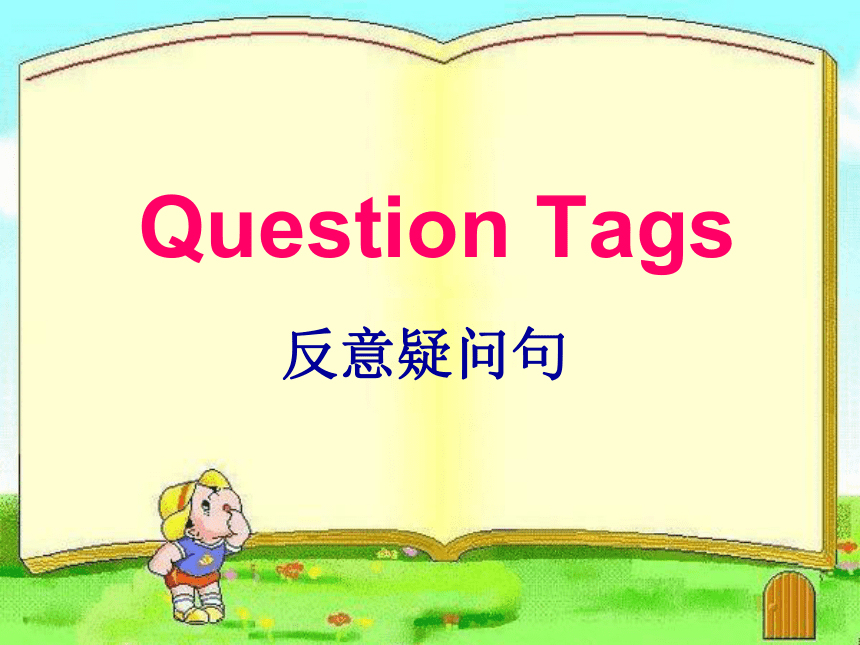 | |
| 格式 | zip | ||
| 文件大小 | 626.1KB | ||
| 资源类型 | 教案 | ||
| 版本资源 | 牛津译林版 | ||
| 科目 | 英语 | ||
| 更新时间 | 2012-11-15 19:07:31 | ||
图片预览

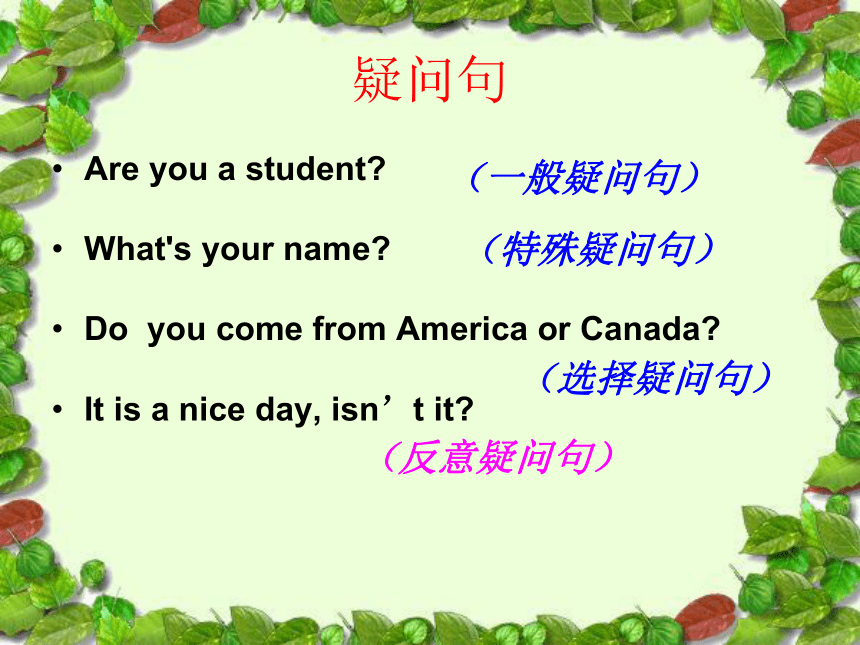
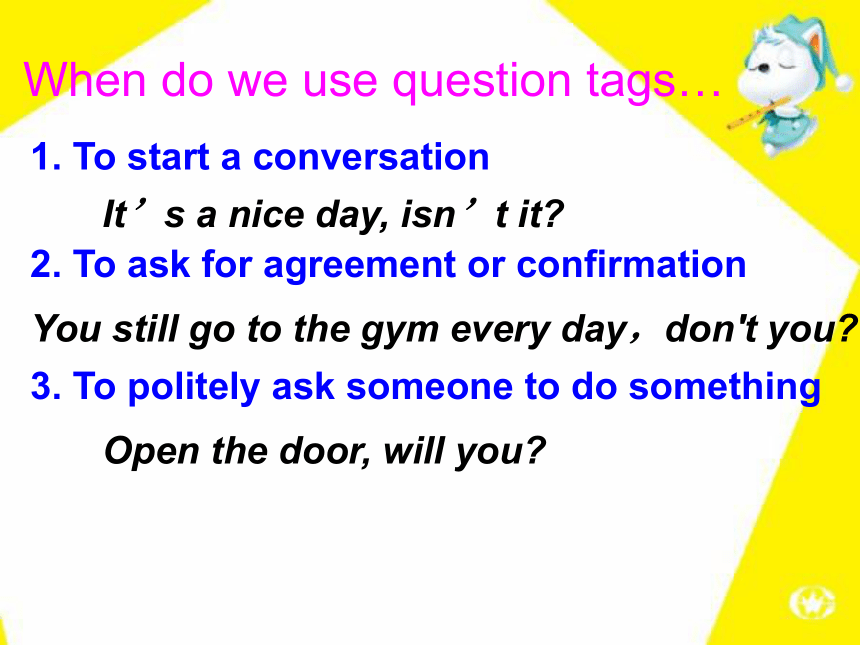
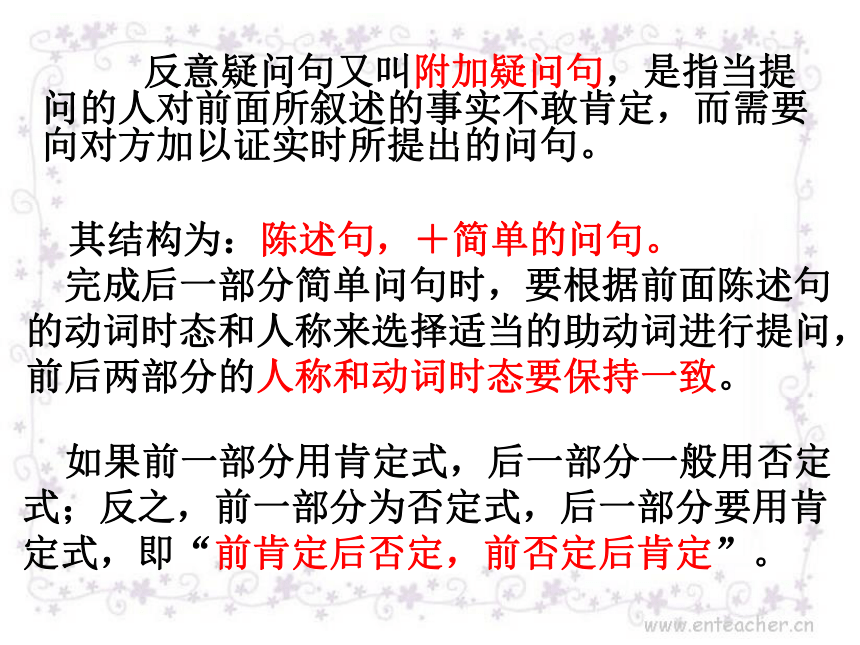
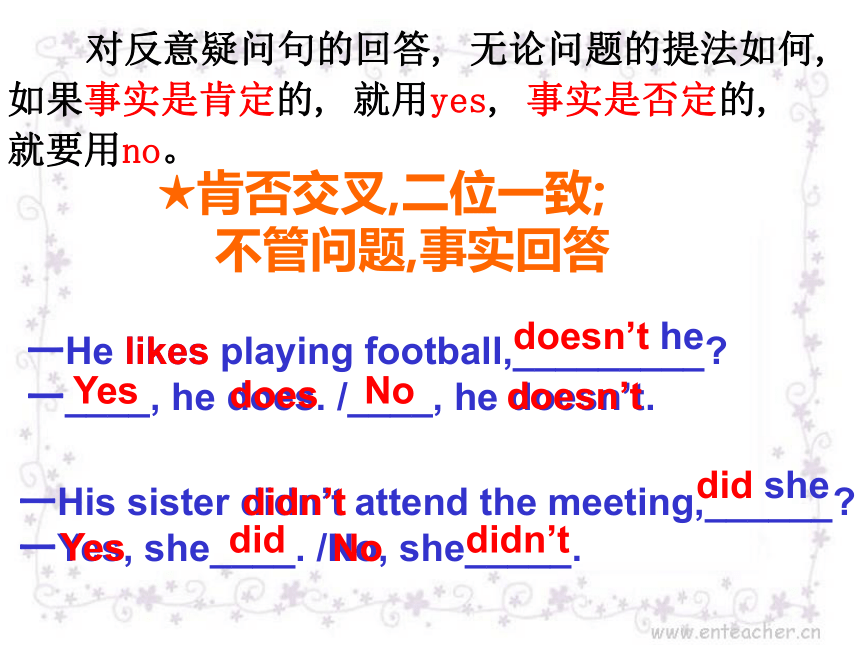
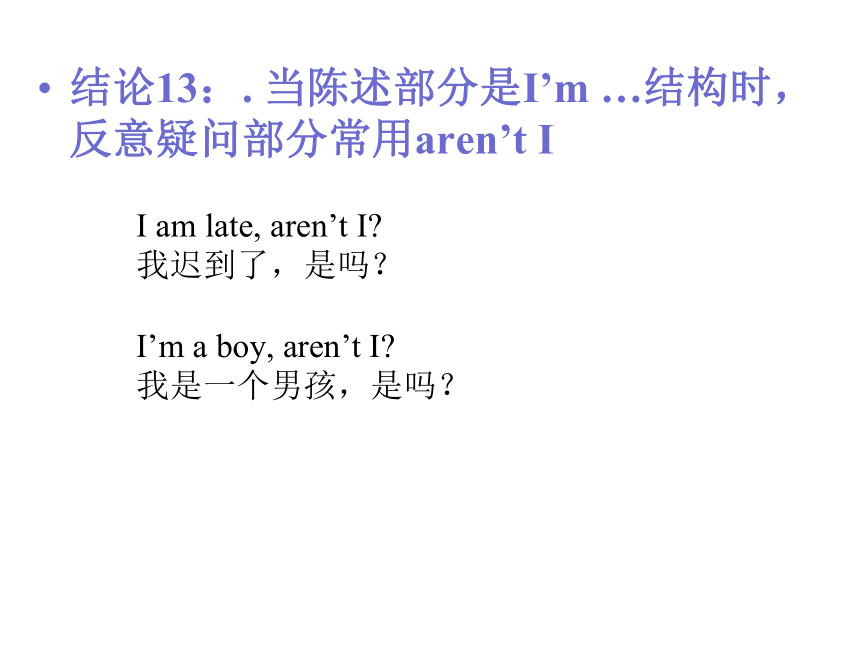
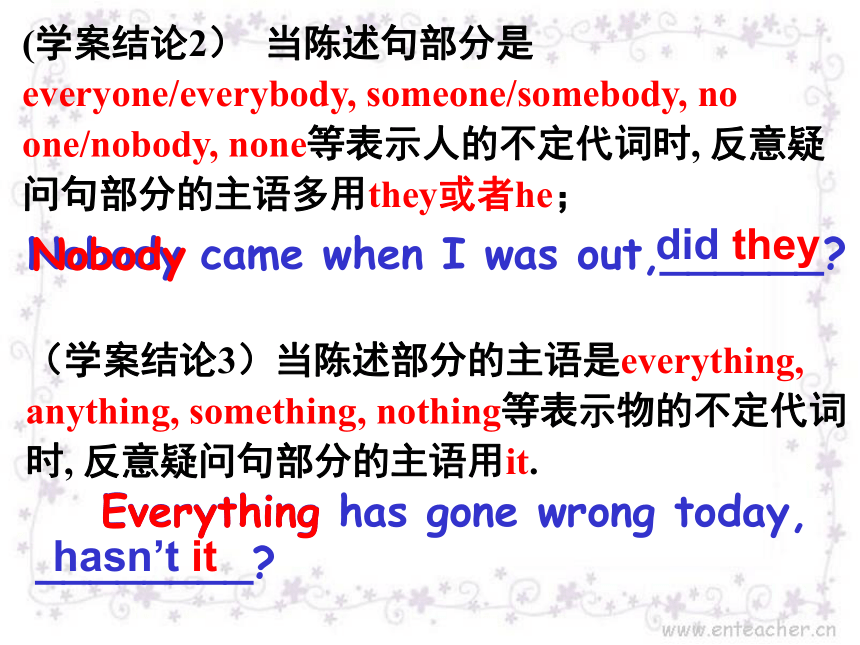
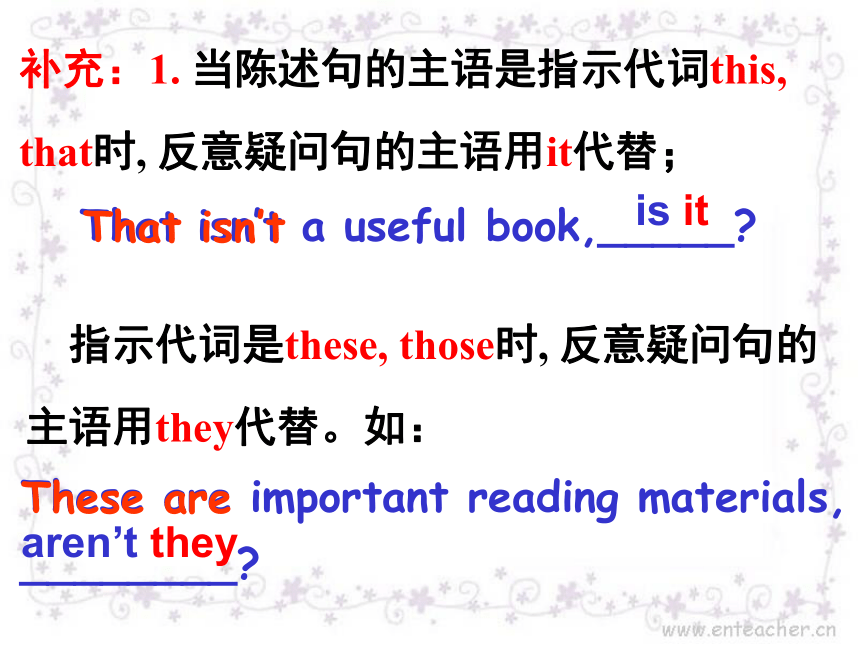
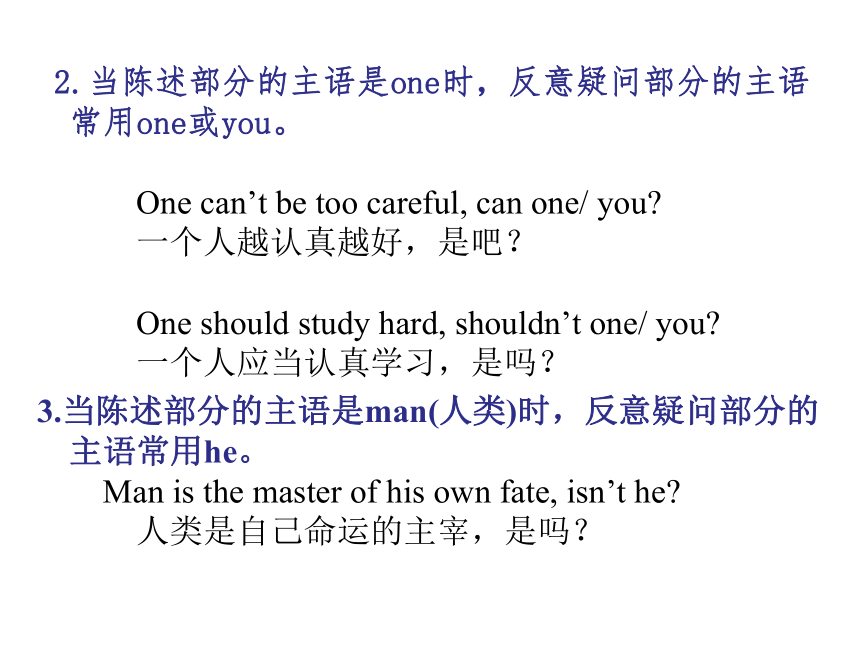
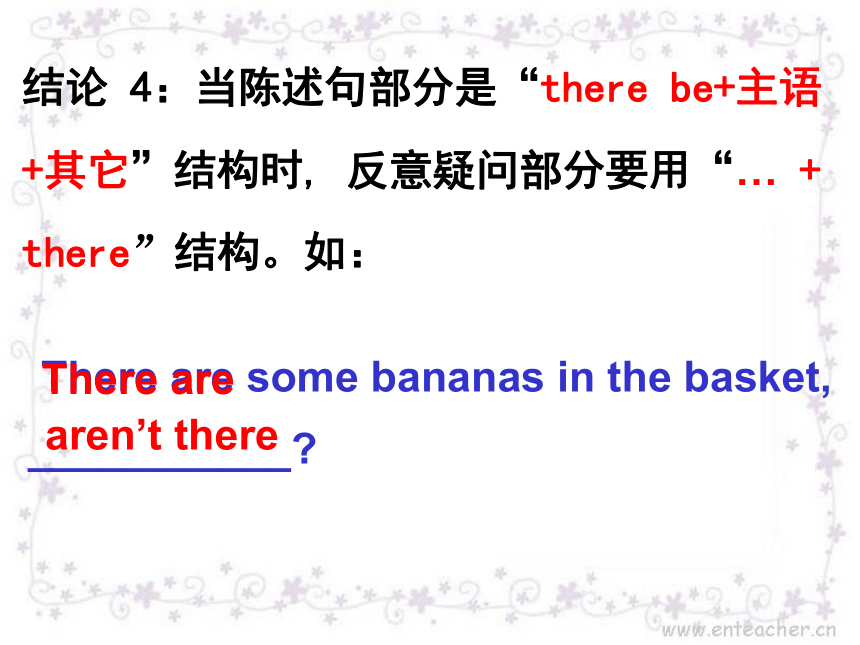
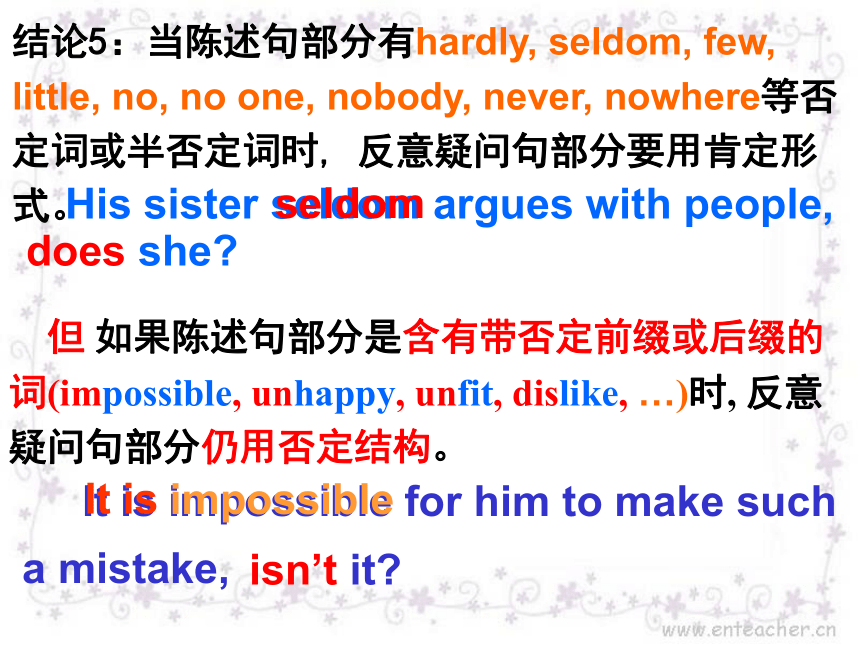
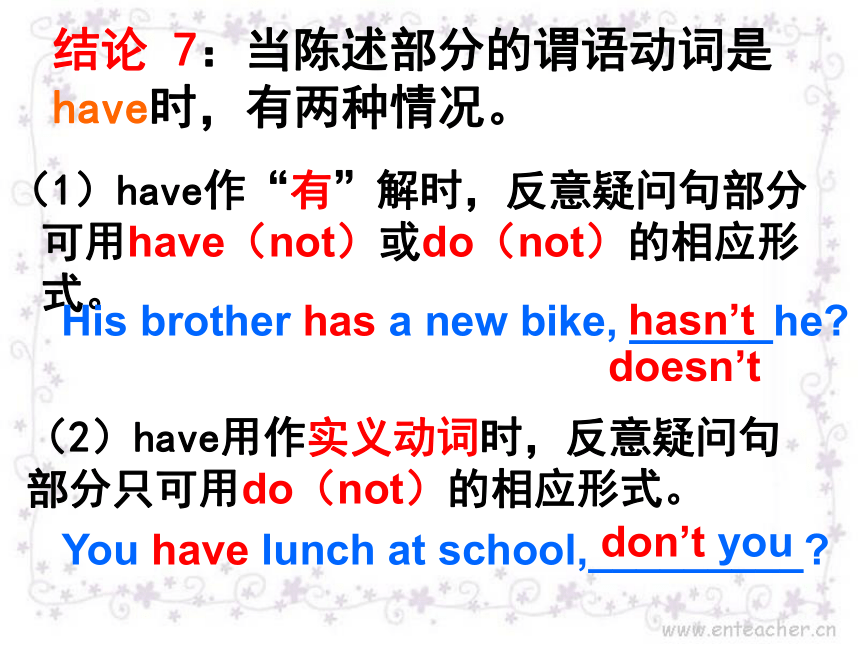
文档简介
课件35张PPT。Question Tags 反意疑问句疑问句Are you a student?
What's your name?
Do you come from America or Canada?
It is a nice day, isn’t it?(一般疑问句)(特殊疑问句)(选择疑问句)(反意疑问句)When do we use question tags…It’s a nice day, isn’t it?1. To start a conversation2. To ask for agreement or confirmationYou still go to the gym every day,don't you?3. To politely ask someone to do something Open the door, will you? 反意疑问句又叫附加疑问句,是指当提问的人对前面所叙述的事实不敢肯定,而需要向对方加以证实时所提出的问句。 如果前一部分用肯定式,后一部分一般用否定式;反之,前一部分为否定式,后一部分要用肯定式,即“前肯定后否定,前否定后肯定”。 其结构为:陈述句,+简单的问句。
完成后一部分简单问句时,要根据前面陈述句的动词时态和人称来选择适当的助动词进行提问,前后两部分的人称和动词时态要保持一致。 对反意疑问句的回答, 无论问题的提法如何, 如果事实是肯定的, 就用yes, 事实是否定的, 就要用no。 一He likes playing football,_________?
一____, he does. /____, he doesn’t. 一His sister didn’t attend the meeting,______?
一Yes, she____. /No, she_____. ★肯否交叉,二位一致;
不管问题,事实回答 doesn’t hedid sheYesNodiddidn’tlikesdidn’tdoesdoesn’tYesNo结论13:. 当陈述部分是I’m …结构时,反意疑问部分常用aren’t I I am late, aren’t I? 我迟到了,是吗? I’m a boy, aren’t I? 我是一个男孩,是吗? (学案结论2) 当陈述句部分是everyone/everybody, someone/somebody, no one/nobody, none等表示人的不定代词时, 反意疑问句部分的主语多用they或者he; Nobody came when I was out,______? (学案结论3)当陈述部分的主语是everything, anything, something, nothing等表示物的不定代词时, 反意疑问句部分的主语用it. Everything has gone wrong today, ________?hasn’t itdid theyNobody Everything 补充:1. 当陈述句的主语是指示代词this, that时, 反意疑问句的主语用it代替;These are important reading materials, ________?That isn’t a useful book,_____? 指示代词是these, those时, 反意疑问句的主语用they代替。如: is itaren’t theyThat isn’tThese are 2.当陈述部分的主语是one时,反意疑问部分的主语常用one或you。 One can’t be too careful, can one/ you? 一个人越认真越好,是吧? One should study hard, shouldn’t one/ you? 一个人应当认真学习,是吗?
3.当陈述部分的主语是man(人类)时,反意疑问部分的主语常用he。 Man is the master of his own fate, isn’t he? 人类是自己命运的主宰,是吗? 结论 4:当陈述句部分是“there be+主语+其它”结构时, 反意疑问部分要用“… + there”结构。如: There are some bananas in the basket, ___________?aren’t thereThere are结论5:当陈述句部分有hardly, seldom, few, little, no, no one, nobody, never, nowhere等否定词或半否定词时, 反意疑问句部分要用肯定形式。 It is impossible for him to make such a mistake, His sister seldom argues with people,
但 如果陈述句部分是含有带否定前缀或后缀的词(impossible, unhappy, unfit, dislike, …)时, 反意疑问句部分仍用否定结构。isn’t it?does she?seldomimpossibleIt is结论 7:当陈述部分的谓语动词是have时,有两种情况。 (1)have作“有”解时,反意疑问句部分可用have(not)或do(not)的相应形式。 His brother has a new bike, ______he? (2)have用作实义动词时,反意疑问句部分只可用do(not)的相应形式。 You have lunch at school,_________? don’t youhasn’tdoesn’t结论 8&9: 当陈述部分有情态动词ought to时,反意疑问句部分要用ought / should (oughtn’t / shouldn’t) 。
如陈述部分为情态动词used to,反意疑问部分可用 usedn’t/didn’t +主语。
补充: 如陈述部分为had better,反意疑问部分用hadn’t +主语。
如陈述部分有would rather,疑问部分多用 wouldn’t +主语。
如陈述部分有You’d like to, 疑问部分用wouldn’t +主语。 Such things ought not to be allowed,
The old man used to smoke,
You’d better do it by yourself,
He would rather read it ten times than recite it,
You’d like to go with me, ought they?didn’t he ? usedn’t hewouldn’t you?wouldn’t he?hadn’t you?ought not toused to’d betterwould rather’d like to 结论10:带情态动词dare或need的反意疑问句,疑问部分常用 dare (need) +主语。 ? We need not do it again,
? He dare not say so, ? 当dare, need 为实义动词时,疑问部分用助动词 do / does/ did + 主语。 She doesn’t dare to go home alone, need we ?dare he?does she?need notdare notdoesn’t dare结论11:当陈述句部分有情态动词must时,反意疑问部分有三种情况 1)must表示“禁止”时即mustn’t,反意疑问部分要用must 。 You mustn’t stop your car here, 2)must表示“有必要,必须”时,反意疑问句部分要用needn’t或者mustn’t。 They must finish the work today, 3)当must用来表示“推测”时,意为“一定、必定”
①对现在的情况进行“推测”时,反意疑问句部分要用“isn’t / aren’t / don’t /doesn’t + 主语”He must be good at maths, must you?needn’t they?isn’t he?mustn’tmustHe is good at mathsmust be→ ②对过去的情况进行“推测” (must + have done)时(一般句中有过去的时间状语),反意疑问句部分要用“wasn’t / weren’t / didn’t + 主语”; She must have read the novel last week, ③对完成的情况进行“推测” (must + have done)时(一般没有过去时间状语),反意疑问句部分要用“haven’t / hasn’t + 主语”。 You must have told her about it, didn’t she?haven’t you? She read the novel last week→ You have told her about it→must have readmust have told 结论12:当陈述部分的谓语动词是表示愿望的I wish时,反意疑问部分要用may I,而且前后两个部分均用肯定式。 I wish to go to the moon by spaceship some day, 补充 :感叹句的反意疑问句一律使用否定式 What a foolish child (he is), may I?isn’t he?I wishWhat结构中反意疑问句的
运用
结论6 补充:并列复合句疑问部分,谓语动词根据邻近从句的谓语而定。当陈述句是由并列连接词and, but, or, for, so等连接的两个并列分句组成时,反意疑问句部分一般与最接近的分句保持一致,也就是说,对后一分句进行反问。 He was a lazy child, and he didn’t pass the exam, did he?anddidn’t 结论6: 一般情况下, 陈述句部分是主从复合句时, 反意疑问句部分的代词和助动词应与主句中的主语和动词保持一致。 He said no one could match him in playing chess, didn’t he?He said 在宾语从句中, 如果陈述句部分是“I think (believe, suppose, imagine, expect等)+宾语从句”, 反意疑问句部分应与宾语从句的主谓保持一致, 并要注意否定转移。(即I don’t think/suppose/believe /imagine 引导的宾语从句,这种宾语从句的反意疑问句应与从句的主语,谓语部分一致,而且用肯定式的提问。) I don’t think you have heard of him before, have you?you haveI don’t thinkdon’t 注意: 当think等这些动词的主语不是第一人称, 或主语是第一人称, 而动词时态不是一般现在时或一般过去时, 这时, 反意疑问句的助动词和人称代词要与主句保持一致。 Mary thinks you will come to the party, doesn’t she?Mary thinks 带有定语从句,疑问部分谓语根据主句的谓语而定: He is not the man who gave us a talk, is he?who gave us a talkHe is not结论12: 祈使句的肯定形式,其反意问句表示“请求”时,通常用will you/would you Be sure to write to us,
Close the window, please,
will you?will you?补充:祈使句的否定形式,其反意疑问句通常只用will you构成。 Don’t smoke in the meeting room,
Don’t be late again, will you?will you ? Let’s go to see the film together, 祈使句构成反意疑问句时, 以Let开头的祈使句,Let’s….开头的疑问部分用shall we, let us……开头的祈使句,附加句用will you。如: Let us go to see the film together, shall we?will you?effect n.效果,作用;影响have an effect on 对……有作用,产生影响
go/come into effect 开始生效
put/bring sth.into effect 使……生效;实行;实施
be of no effect 无效
take effect 生效,开始实施;起作用
in effect实际上;(规则,法律等)在实施中,有效
effect n.效果,作用;影响have an effect on 对……有作用,产生影响
go/come into effect 开始生效
put/bring sth.into effect 使……生效;实行;实施
be of no effect 无效
take effect 生效,开始实施;起作用
in effect实际上;(规则,法律等)在实施中,有效
5.(2010·湖北宜昌统考)Since we are not wealthy now,
we'd better take our daily expenses into .
A.thought B.account
C.position D.effect
解析:考查名词辨析。句意: 既然我们现在并不富裕,我们应把日常的花销考虑在内。take...into account/consideration为固定搭配,表示“把……考虑进去”。thought“思索,想法”;position“位置,境况,形势,(社会)地位,职务”;effect“结果,效果,影响”。
答案:B
fall out(头发或牙齿)脱落;失和,闹翻They fell out with each other just before their marriage.
他们就在举行婚礼之前吵了起来。
My dad's hair when he was in his thirties.
我爸爸三十多岁时就开始掉头发了。
?fell outfall over 被……绊倒
fall down 倒塌
fall back 后退;撤退
fall off 数量或质量下降
fall asleep/ill 入睡/生病
fall behind 落后于……
fall in love with... 爱上……
2.He has with his wife for drinking too much.
A.fallen down B.fallen off
C.fallen back D.fallen out
解析:句意:他因喝多了酒和妻子闹翻了。fall out“失和,闹翻”;fall down“倒塌”;fall off“数量或质量下降”;fall back“后退,撤退”。
答案:D
Thank you!
What's your name?
Do you come from America or Canada?
It is a nice day, isn’t it?(一般疑问句)(特殊疑问句)(选择疑问句)(反意疑问句)When do we use question tags…It’s a nice day, isn’t it?1. To start a conversation2. To ask for agreement or confirmationYou still go to the gym every day,don't you?3. To politely ask someone to do something Open the door, will you? 反意疑问句又叫附加疑问句,是指当提问的人对前面所叙述的事实不敢肯定,而需要向对方加以证实时所提出的问句。 如果前一部分用肯定式,后一部分一般用否定式;反之,前一部分为否定式,后一部分要用肯定式,即“前肯定后否定,前否定后肯定”。 其结构为:陈述句,+简单的问句。
完成后一部分简单问句时,要根据前面陈述句的动词时态和人称来选择适当的助动词进行提问,前后两部分的人称和动词时态要保持一致。 对反意疑问句的回答, 无论问题的提法如何, 如果事实是肯定的, 就用yes, 事实是否定的, 就要用no。 一He likes playing football,_________?
一____, he does. /____, he doesn’t. 一His sister didn’t attend the meeting,______?
一Yes, she____. /No, she_____. ★肯否交叉,二位一致;
不管问题,事实回答 doesn’t hedid sheYesNodiddidn’tlikesdidn’tdoesdoesn’tYesNo结论13:. 当陈述部分是I’m …结构时,反意疑问部分常用aren’t I I am late, aren’t I? 我迟到了,是吗? I’m a boy, aren’t I? 我是一个男孩,是吗? (学案结论2) 当陈述句部分是everyone/everybody, someone/somebody, no one/nobody, none等表示人的不定代词时, 反意疑问句部分的主语多用they或者he; Nobody came when I was out,______? (学案结论3)当陈述部分的主语是everything, anything, something, nothing等表示物的不定代词时, 反意疑问句部分的主语用it. Everything has gone wrong today, ________?hasn’t itdid theyNobody Everything 补充:1. 当陈述句的主语是指示代词this, that时, 反意疑问句的主语用it代替;These are important reading materials, ________?That isn’t a useful book,_____? 指示代词是these, those时, 反意疑问句的主语用they代替。如: is itaren’t theyThat isn’tThese are 2.当陈述部分的主语是one时,反意疑问部分的主语常用one或you。 One can’t be too careful, can one/ you? 一个人越认真越好,是吧? One should study hard, shouldn’t one/ you? 一个人应当认真学习,是吗?
3.当陈述部分的主语是man(人类)时,反意疑问部分的主语常用he。 Man is the master of his own fate, isn’t he? 人类是自己命运的主宰,是吗? 结论 4:当陈述句部分是“there be+主语+其它”结构时, 反意疑问部分要用“… + there”结构。如: There are some bananas in the basket, ___________?aren’t thereThere are结论5:当陈述句部分有hardly, seldom, few, little, no, no one, nobody, never, nowhere等否定词或半否定词时, 反意疑问句部分要用肯定形式。 It is impossible for him to make such a mistake, His sister seldom argues with people,
但 如果陈述句部分是含有带否定前缀或后缀的词(impossible, unhappy, unfit, dislike, …)时, 反意疑问句部分仍用否定结构。isn’t it?does she?seldomimpossibleIt is结论 7:当陈述部分的谓语动词是have时,有两种情况。 (1)have作“有”解时,反意疑问句部分可用have(not)或do(not)的相应形式。 His brother has a new bike, ______he? (2)have用作实义动词时,反意疑问句部分只可用do(not)的相应形式。 You have lunch at school,_________? don’t youhasn’tdoesn’t结论 8&9: 当陈述部分有情态动词ought to时,反意疑问句部分要用ought / should (oughtn’t / shouldn’t) 。
如陈述部分为情态动词used to,反意疑问部分可用 usedn’t/didn’t +主语。
补充: 如陈述部分为had better,反意疑问部分用hadn’t +主语。
如陈述部分有would rather,疑问部分多用 wouldn’t +主语。
如陈述部分有You’d like to, 疑问部分用wouldn’t +主语。 Such things ought not to be allowed,
The old man used to smoke,
You’d better do it by yourself,
He would rather read it ten times than recite it,
You’d like to go with me, ought they?didn’t he ? usedn’t hewouldn’t you?wouldn’t he?hadn’t you?ought not toused to’d betterwould rather’d like to 结论10:带情态动词dare或need的反意疑问句,疑问部分常用 dare (need) +主语。 ? We need not do it again,
? He dare not say so, ? 当dare, need 为实义动词时,疑问部分用助动词 do / does/ did + 主语。 She doesn’t dare to go home alone, need we ?dare he?does she?need notdare notdoesn’t dare结论11:当陈述句部分有情态动词must时,反意疑问部分有三种情况 1)must表示“禁止”时即mustn’t,反意疑问部分要用must 。 You mustn’t stop your car here, 2)must表示“有必要,必须”时,反意疑问句部分要用needn’t或者mustn’t。 They must finish the work today, 3)当must用来表示“推测”时,意为“一定、必定”
①对现在的情况进行“推测”时,反意疑问句部分要用“isn’t / aren’t / don’t /doesn’t + 主语”He must be good at maths, must you?needn’t they?isn’t he?mustn’tmustHe is good at mathsmust be→ ②对过去的情况进行“推测” (must + have done)时(一般句中有过去的时间状语),反意疑问句部分要用“wasn’t / weren’t / didn’t + 主语”; She must have read the novel last week, ③对完成的情况进行“推测” (must + have done)时(一般没有过去时间状语),反意疑问句部分要用“haven’t / hasn’t + 主语”。 You must have told her about it, didn’t she?haven’t you? She read the novel last week→ You have told her about it→must have readmust have told 结论12:当陈述部分的谓语动词是表示愿望的I wish时,反意疑问部分要用may I,而且前后两个部分均用肯定式。 I wish to go to the moon by spaceship some day, 补充 :感叹句的反意疑问句一律使用否定式 What a foolish child (he is), may I?isn’t he?I wishWhat结构中反意疑问句的
运用
结论6 补充:并列复合句疑问部分,谓语动词根据邻近从句的谓语而定。当陈述句是由并列连接词and, but, or, for, so等连接的两个并列分句组成时,反意疑问句部分一般与最接近的分句保持一致,也就是说,对后一分句进行反问。 He was a lazy child, and he didn’t pass the exam, did he?anddidn’t 结论6: 一般情况下, 陈述句部分是主从复合句时, 反意疑问句部分的代词和助动词应与主句中的主语和动词保持一致。 He said no one could match him in playing chess, didn’t he?He said 在宾语从句中, 如果陈述句部分是“I think (believe, suppose, imagine, expect等)+宾语从句”, 反意疑问句部分应与宾语从句的主谓保持一致, 并要注意否定转移。(即I don’t think/suppose/believe /imagine 引导的宾语从句,这种宾语从句的反意疑问句应与从句的主语,谓语部分一致,而且用肯定式的提问。) I don’t think you have heard of him before, have you?you haveI don’t thinkdon’t 注意: 当think等这些动词的主语不是第一人称, 或主语是第一人称, 而动词时态不是一般现在时或一般过去时, 这时, 反意疑问句的助动词和人称代词要与主句保持一致。 Mary thinks you will come to the party, doesn’t she?Mary thinks 带有定语从句,疑问部分谓语根据主句的谓语而定: He is not the man who gave us a talk, is he?who gave us a talkHe is not结论12: 祈使句的肯定形式,其反意问句表示“请求”时,通常用will you/would you Be sure to write to us,
Close the window, please,
will you?will you?补充:祈使句的否定形式,其反意疑问句通常只用will you构成。 Don’t smoke in the meeting room,
Don’t be late again, will you?will you ? Let’s go to see the film together, 祈使句构成反意疑问句时, 以Let开头的祈使句,Let’s….开头的疑问部分用shall we, let us……开头的祈使句,附加句用will you。如: Let us go to see the film together, shall we?will you?effect n.效果,作用;影响have an effect on 对……有作用,产生影响
go/come into effect 开始生效
put/bring sth.into effect 使……生效;实行;实施
be of no effect 无效
take effect 生效,开始实施;起作用
in effect实际上;(规则,法律等)在实施中,有效
effect n.效果,作用;影响have an effect on 对……有作用,产生影响
go/come into effect 开始生效
put/bring sth.into effect 使……生效;实行;实施
be of no effect 无效
take effect 生效,开始实施;起作用
in effect实际上;(规则,法律等)在实施中,有效
5.(2010·湖北宜昌统考)Since we are not wealthy now,
we'd better take our daily expenses into .
A.thought B.account
C.position D.effect
解析:考查名词辨析。句意: 既然我们现在并不富裕,我们应把日常的花销考虑在内。take...into account/consideration为固定搭配,表示“把……考虑进去”。thought“思索,想法”;position“位置,境况,形势,(社会)地位,职务”;effect“结果,效果,影响”。
答案:B
fall out(头发或牙齿)脱落;失和,闹翻They fell out with each other just before their marriage.
他们就在举行婚礼之前吵了起来。
My dad's hair when he was in his thirties.
我爸爸三十多岁时就开始掉头发了。
?fell outfall over 被……绊倒
fall down 倒塌
fall back 后退;撤退
fall off 数量或质量下降
fall asleep/ill 入睡/生病
fall behind 落后于……
fall in love with... 爱上……
2.He has with his wife for drinking too much.
A.fallen down B.fallen off
C.fallen back D.fallen out
解析:句意:他因喝多了酒和妻子闹翻了。fall out“失和,闹翻”;fall down“倒塌”;fall off“数量或质量下降”;fall back“后退,撤退”。
答案:D
Thank you!
